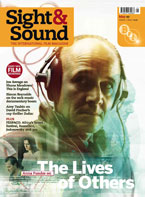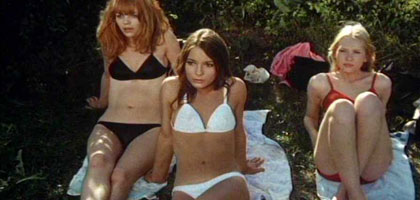Primary navigation


In 1970 a film exploring the sexuality of German teenagers sparked a storm and inspired a dozen sequels. By Tim Lucas
In 1969, West Germany thrilled to the publication of Dr Günther Hunold's Schoolgirl Report: What Parents Don't Think Is Possible (Schulmädchen-Report: Was Eltern nicht für möglich halten), in which the esteemed psychologist interviewed 36 young women, aged 14 to 20, who spoke to him with unprecedented candour about sexuality in general and their sex lives in particular. The book became an immediate bestseller and a pet controversy of the German media, comparable to the contemporaneous success of Dr David Reuben's Everything You Always Wanted to Know About Sex* (*But Were Afraid to Ask) in English-speaking countries. So it came as no surprise when the film rights were acquired - not by Woody Allen, but by Rapid Film producer Wolf C. Hartwig, whose 1958 production Sin Began with Eve (Mit Eva fing die Sünde an) provided the raw material for The Playgirls and the Bellboy, a composite 3D 'nudie-cutie' concocted in 1962 by UCLA grads Francis Ford Coppola and Jack Hill.
The resulting film - a combination of dramatic re-enactments and at least partly genuine on-the-street interviews with teenage girls - was a huge success, not only in Germany but worldwide, inspiring a dozen sequels over a ten-year run. Available here with English subtitles for the first time, the film is a compelling artefact. Nakedly exploitative on one hand, educationally minded and idealistic on the other, it also has the ring of a revolutionary act, lending its voice to the tensions that had developed by the end of the 1960s between the post-war youth of West Germany and their overly strict, beer-chugging, Hitlerjugend parents. An opening narration by a young woman speaks for her entire generation, yearning for "a new morality without hypocrisy" and pointing an accusing finger at "you, the adults, [who] have been lying too much."
The main story (which is dramatised) involves 18-year-old Renata, who is threatened with expulsion from school on the eve of her graduation after being caught in flagrante with a bus driver during a class field trip. When the school board demands an explanation for her behaviour, Renata's only defence is, "I'm 18 and I live in the 20th century." Her right to be treated as a progressive young adult is argued on her behalf by psychologist Dr Bernauer (played by Günther Kieslich, who later reprised the role for the sixth 'Report' film). This is not to say that Schoolgirl Report #1 is always on the side of impetuous youth; in the story of two sexually curious 16-year-olds who set themselves the test of arousing a handsome young priest, the plan backfires due to their insincerity. There is a philosophy, a morality at work here, not to mention an absence of sniggering, that you simply can't find in the Confessions of... or Porky's movies. Later films in the series did, however, lean in a more comic direction.
Directed by Ernst Hofbauer, the film is more conservative than it may seem. Despite its title, all the young women who engage in its softcore activities look at least 18, and the film itself, while outrageous and defiant on certain levels, is not entirely anti-authority (Dr Bernauer is a dad too) or without tenderness. The most hair-raising chapters of Dr Hunold's book - such as 'Incest without Guilt (Barbara, 14)' and 'Orgasms with Suppositories (Cornelia, 18)' - have been jettisoned, and the closing story about the loss of virginity illustrates with a well-placed tear that such milestones are most meaningful when love is involved.
This no-frills disc from Impulse Pictures offers Schoolgirl Report #1 in a colourful 1.66:1 anamorphic transfer. Its moderate grain is due to its 16mm origins, as is its slightly cropped and compacted 16:9-adapted look. The English translation of the original dialogue is a revelation. However, as one who discovered the 'Report' films in their dubbed export versions (which could be hilarious, unctuous, dotty, or all three at once), the lack of a vintage dubbing track is a terrible loss. Comparing the two audio streams might have been - dare I say it? - educational.